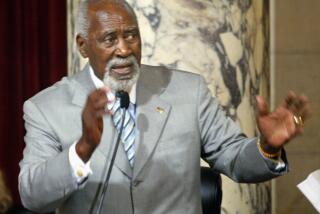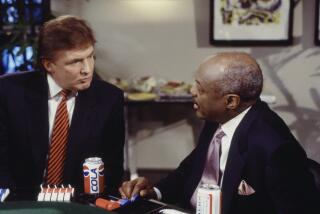Source of Brown Drug Charge Emerges : Campaign: Former State Police veteran repeats his accusations on network news. The Californian again flatly denies the allegations.
One of ABC News’ six anonymous sources who have alleged that drugs were used at the Los Angeles home of Edmund G. (Jerry) Brown Jr. while he was governor went public with his accusations Wednesday.
Robert E. Ford, now a weapons designer for Rocky Mountain Arms Inc., an arms manufacturer in Longmont, Colo., said on ABC’s nationwide news broadcast that while he was with the California State Police, from 1976 to 1978, he and other security officers saw marijuana cigarette butts in ashtrays at Brown’s Laurel Canyon home and found a white, powdery residue there that tested positive for cocaine content.
“We’d find small roaches left, rather incompletely burned marijuana cigarettes,” he said. “You could smell marijuana coming from the residence.”
Brown has flatly denied the allegations. Campaigning for the Democratic presidential nomination in Pennsylvania on Wednesday, he said: “We are trying to keep up with this malicious story of ABC’s. . . . We are going to prove ABC wrong, and I’m going to want an apology from (ABC president) Roone Arledge.”
Ford said in the brief, on-camera interview that he was convinced that Brown was aware of the alleged drug use.
“As far as him stating that he didn’t see it,” Ford said of Brown’s denials, “he would have to be blind and have no sense of smell to not be aware of what was going on there.”
Ford did not say, however, that he saw anyone in the Brown home use either of the drugs.
Pressed for details later in telephone interviews, Ford told The Times he did not believe Brown used drugs.
“He has some strange habits, but dope is not one of them,” he said.
“It could have been (his) friends were there,” he went on. “But officers could smell marijuana there when the governor came. Sometimes, the smell was in the air.”
Ford also said he felt Brown did not like to have officers on his security detail who had worked for Ronald Reagan, his predecessor.
“There was an animosity between us that should never have occurred,” he said.
Brown could not be reached for comment on the point.
Ford told ABC that he and other officers were warned by supervisors to ignore the alleged drug use.
“We were told ‘if you enjoy your job, you’d better re-evaluate what you are seeing,’ ” Ford said. “Or, ‘if you’re that uncomfortable, we have another assignment available for you.’ ”
ABC said that Ford told them he reported the drug allegations to Capt. Donald Buckland, now retired. Contacted by The Times, he called Ford’s allegations “a damn, out-and-out lie.
“If this kind of stuff was reported to me, involving the governor, it would have instantly been reported upward,” he said. “It was never reported to me. It was always quiet out there (at the Brown home).”
In Sacramento, Capt. Robert Donnalley, spokesman for the State Police, confirmed that Ford had been with the department in the Los Angeles area during Brown’s first term as governor, before 1978. Ford joined the Pasadena Police Department on Sept. 11, 1978, and left Nov. 17, 1986, a Pasadena spokesman said.
The charges of drug use at Brown’s home were first aired by ABC last week, and heatedly denied by Brown and many of his associates. The network came under fire from them and some figures in the news media for using only anonymous sources in its initial reports.
During his campaign day Wednesday, Brown pitched himself squarely at organized labor in heavily unionized Pennsylvania. He stressed his support for strengthening unions and for instituting universal medical care during appearances before labor groups in Erie and Bethlehem. He denied that his chances had been undercut when a key AFL-CIO committee recommended Monday that the 14-million member labor group endorse Arkansas Gov. Bill Clinton for the Democratic nomination.
Brown repeatedly stressed his support for a “single-payer” universal health insurance program run by the government or by private, nonprofit agencies.
Referring to Harris Wofford, a Pennsylvania Democrat who won an upset victory for U.S. Senate last year largely on the strength of his advocacy of universal medical care, Brown noted that no such program has yet emerged from Congress.
“Why? Because $30 million goes into the (congressional) campaigns from drug companies, from insurance companies and from equipment manufacturers,” he said.
Times staff writers Jack Cheevers in Erie, Pa., and John Hurst in Sacramento contributed to this story. Gladstone reported from Sacramento, Reich from Los Angeles.
More to Read
Get the L.A. Times Politics newsletter
Deeply reported insights into legislation, politics and policy from Sacramento, Washington and beyond. In your inbox three times per week.
You may occasionally receive promotional content from the Los Angeles Times.










